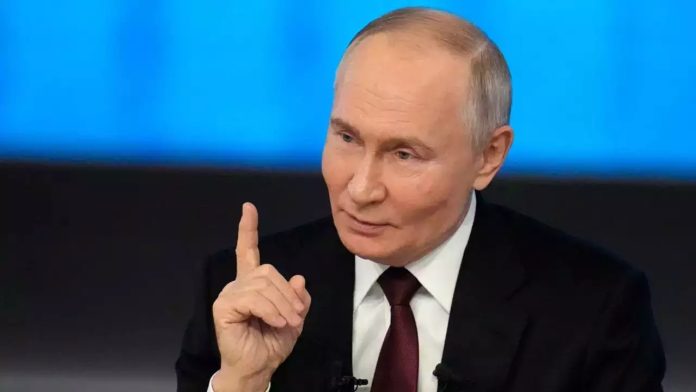Moscow: Russian President Vladimir Putin on Thursday held his annual news conference. Putin echoed India’s stance on BRICS as ” non-western”. Expressing his views about BRICS, the Russian President said the group is not working against any country, rather it is working for the interests of the member nations.
During the annual news conference, Putin called External Affairs Minister S Jaishankar’s statement – ‘BRICS isn’t anti-Western. It’s just not Western’ – best, reported The Times of India. He added that BRICS is not trying to build any negative agenda. While speaking about PM Modi, the Russian President said that he has warm relations with the Indian Prime Minister.
On Ukraine War:
Putin boasted about gains in Ukraine by Russian forces He claimed that sending troops into Ukraine in 2022 has boosted Russia’s military and economic power, reported The Associated Press. He also said that if he could go back in time, he “would have thought that such a decision should have been made earlier,” and Russia should have “prepared for it in advance and more thoroughly.”
“Russia has become much stronger over the past two or three years because it has become a truly sovereign country,” he said. “We are standing firm in terms of economy, we are strengthening our defence potential and our military capability now is the strongest in the world,” Putin added.
The Russian President said he was open to possible talks with US President-elect Donald Trump, who has pledged to negotiate a deal to end the conflict in Ukraine.
“If we meet with Mr Trump, we will have things to discuss,” he said.
Putin On Syria:
The Russian President, in his first reaction after ousted Syrian President Bashar-al-Assad, said that he had not met him. However, Putin said that he would ask him about Austin Tice, an American journalist who vanished in Syria 12 years ago.
Moscow has sought to establish contacts with the rebels who ousted Assad to secure its diplomatic and military personnel in the country and try to extend the lease on its air and naval bases in the country.
“If we stay there, we will need to do something in the interests of the host country,” he said.








































